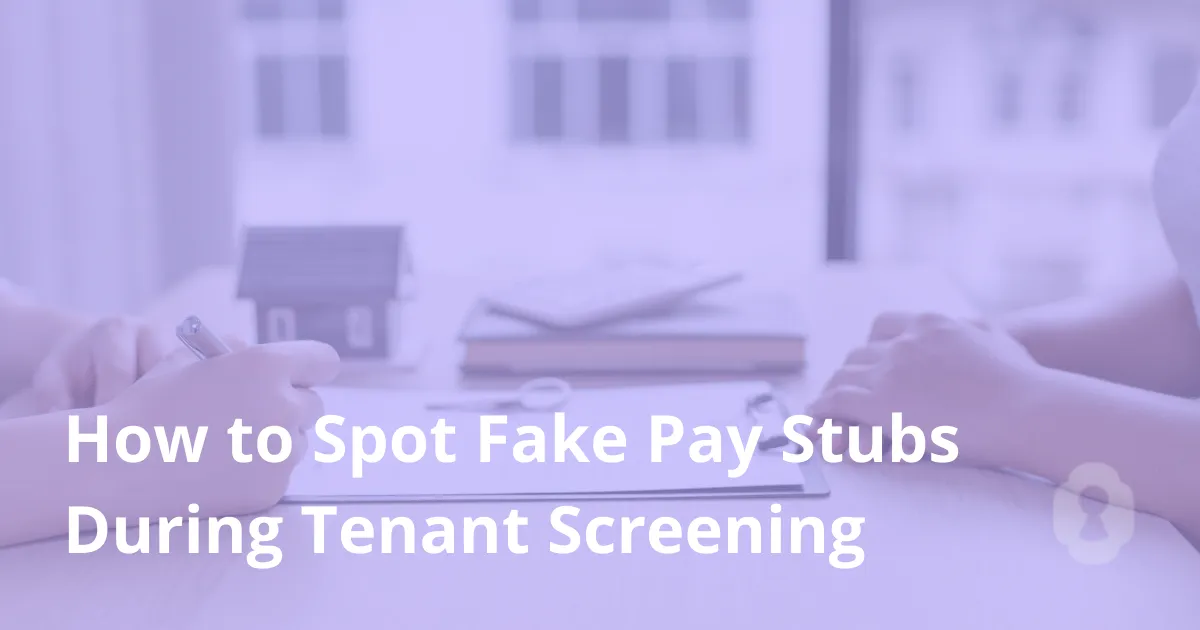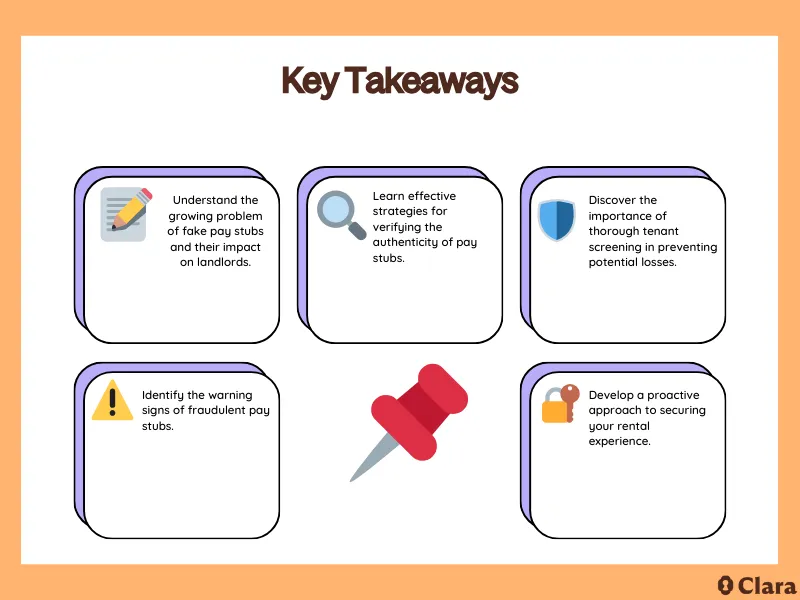
The rise of online rental applications has brought a new challenge. It's harder for landlords and property managers to check if documents are real. Recently, fake pay stubs have become more common, making it tough to tell real from fake.
To tackle this issue, it's crucial to know how to spot fraudulent pay stubs during tenant screening. By recognizing warning signs and being proactive, you can avoid financial losses. This ensures a safer rental experience for everyone.

"In the rental industry, we've traditionally focused on detecting document fraud after it happens, but this reactive approach leaves both property owners and honest renters vulnerable. The real opportunity lies in creating application processes that make fraud unnecessary in the first place. By implementing income verification systems that accommodate diverse earning situations—like gig workers, freelancers, and those with multiple income streams—we can create pathways for qualified applicants who might otherwise feel pressured to misrepresent their finances. The most successful property managers aren't just fraud detectors; they're opportunity creators who build flexible yet secure verification systems that recognize today's complex income realities while maintaining necessary protections."
Taylor Wilson, CEO of Rent with Clara
Pay stubs serve as the primary way to verify income and determine whether a potential tenant can truly afford your rent. Most property managers require tenants to earn at least 2.5 to 3 times the monthly rent to ensure they can consistently pay their rent in full without financial strain.
By reviewing recent pay stubs, landlords can assess all sources of income and establish a clear picture of the applicant's financial stability before making rental decisions.
A thorough tenant screening process that includes verifying proof of income protects landlords from costly mistakes and reduces the risk of missed rent payments. Pay stubs reveal crucial details about employment stability, including the pay period frequency, gross income, and tax withholdings that indicate legitimate employment.
When landlords properly verify the information contained in pay stubs, they can confidently screen a tenant and make informed decisions about who should rent your property.
The screening process to ensure qualified tenants goes beyond just confirming income amounts. Pay stubs help landlords evaluate whether an applicant's income is reliable and sufficient to cover monthly rent along with other living expenses.
This verification step is essential for maintaining steady cash flow and avoiding the lengthy eviction process that often results when tenants cannot meet their rental obligations.
Fake pay stubs in rental applications are a big worry for landlords everywhere. As more people rent homes, more fake income documents appear.
Tenants might use these fake pay stubs to make it seem like they can afford more than they can.
Tenants might fake their income for a few reasons. They might want a nicer apartment or to get approved fast. A study found that many rental applications have income lies.
"The ease with which one can create convincing fake pay stubs has increased significantly with advancements in digital technology." - Taylor Wilson
Landlords need to watch closely when screening tenants. Knowing why tenants lie can help landlords catch and stop fraud.
Landlords face big risks if they accept fake income proof. They might get tenants who can't pay rent, leading to missed payments or eviction. Fake pay stubs can also cause financial losses and legal trouble.
For tips on spotting fake pay stubs, landlords can check out this guide.
Spotting fake pay stubs is key to good tenant screening. Landlords need to watch for small mistakes and oddities. This helps protect their property and income.
Start by looking at the pay stub's design. Real pay stubs have specific formats and designs. Fake ones often lack these features.
Watch for:
A low-resolution image or blurred company logo might mean it's fake. Always compare the pay stub with other documents the tenant provides.
Fake pay stubs often have math mistakes or wrong calculations. Checking the math can reveal fraud.
Look out for:
For example, a pay stub with exactly $4,000 in earnings before taxes might be suspicious. Real pay stubs usually have more varied and precise figures.
Tax withholdings are important in a pay stub. Fake pay stubs might miss these details or get them wrong.
Be cautious of pay stubs that:
To check if a pay stub is real, landlords can compare it with other financial documents. This includes bank statements or tax returns. This careful check can help avoid accepting fake documents.
"Verifying the authenticity of financial documents is crucial in preventing fraud and ensuring a secure rental process."
When applicants try to fake proof of income, they often create fake pay stubs using easily accessible online templates and generators. These fraudulent documents typically mimic professional pay stub designs but contain telltale signs of a fake pay stub, such as perfectly rounded numbers, unrealistic pay period calculations, or missing employer tax identification numbers.
Some applicants will alter legitimate pay stubs by inflating their actual wages or adding fictitious overtime hours to appear more financially qualified.
More sophisticated fraud attempts involve creating entirely fictional employment scenarios, complete with fake company websites and accomplices who pose as supervisors during employment verification calls. These applicants may present recent pay stubs from non-existent companies or use real business names while fabricating their employment details.
Property managers should be particularly cautious when reviewing an applicant's pay stub that shows unusually high wages for entry-level positions or contains inconsistent formatting compared to standard payroll processing systems.
The rise of digital editing tools has made it easier for dishonest applicants to manipulate legitimate documents, making background checks and comprehensive tenant screening more critical than ever. Landlords should implement multiple verification methods rather than relying solely on pay stubs, as determined fraudsters may present convincing forgeries that require additional scrutiny to detect.
To stop pay stub fraud, it's crucial to know the key tools and methods. Landlords can use both manual checks and advanced tech to verify pay stubs well.
Digital verification tools have changed how landlords check pay stubs. These tools use AI to find oddities in pay stubs, helping spot fakes.
Some top digital tools include:
Using digital tools saves time and effort in verifying pay stubs. They offer a more precise check than manual reviews alone.
Checking pay stubs against other financial papers is also key. Landlords can ask for bank statements to match the income on the pay stub.
By looking at several financial papers, landlords can get a clearer view of a tenant's finances. This helps lower the chance of accepting fake income verification papers.
For landlords who want less work, professional verification services are a good choice. These services focus on checking income and jobs, adding security for landlords.
When picking a professional service, look at:
By using these ways to verify pay stubs, landlords can cut down fraud risks. This makes the tenant screening process more reliable.
A thorough income verification process is essential for a good tenant screening. It involves several important steps. These steps help landlords check if a potential tenant's income documents are real.
Landlords should make a standard screening plan. This plan should list the income documents needed, like pay stubs and tax returns. It should also explain how to review these documents.
The steps include:
This standard plan helps landlords avoid fake documents. It also makes sure all applicants are treated fairly.
Landlords need to know the law when asking for financial info. They must follow laws like the Fair Credit Reporting Act (FCRA) and the Fair Housing Act.
They should also make sure they're not discriminating. This means not judging based on age, sex, or marital status.
If a landlord thinks a tenant's documents are fake, they should act fast.
This might mean:
Landlords should keep records of their income checks. This helps them make fair decisions.
By having a detailed income check process, landlords can keep their property safe. They also lower the chance of renting to unqualified or dishonest tenants.
There are many ways to check if a potential tenant can pay rent. Pay stubs are common, but they're not the only way. Other methods can give a clearer picture of a tenant's financial health.
Bank statements are a good alternative. They show a tenant's income, expenses, and savings. By looking at these, landlords can see if the income is steady and if the tenant is financially stable. Direct deposits confirm regular income.
Landlords can check bank statements over several months. This is helpful for self-employed people or those with irregular income.
Directly asking the employer about a tenant's job is another good method. This can be done by phone or with a letter. It confirms the tenant's job, stability, and income. This helps landlords decide if the tenant is a good risk.
A property management expert says, "Checking employment is key in tenant screening. It makes sure the tenant has a steady income." Learn more about tenant income verification.
Tax returns and W-2 forms are useful too. They show a tenant's income history. This is great for self-employed people or those with complex income.
To keep your rental property safe, it's key to screen tenants well. Checking their income and spotting fake pay stubs helps a lot. This way, you can avoid evictions and financial losses.
Doing a thorough income check is important. It includes using digital tools, comparing with other financial papers, and getting help from experts.
These steps help make sure your tenants are honest about their money. This protects your investment and keeps your rental income steady.
Renting out your property can be very profitable. But, it needs careful handling. By being strict with tenant screening, you can cut down risks and increase profits. This ensures your rental property does well for a long time.